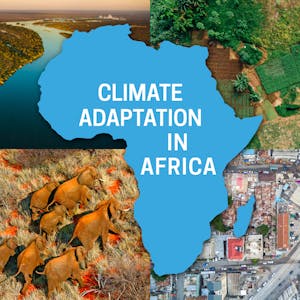Climate Adaptation in Africa
About this Course
This course explores why climate change adaptation is important globally and in the African context. Africa is considered to be one of the most vulnerable regions to climate change. Historically, climate-related hazards such as drought, flooding, pest and disease outbreaks, coastal storms, and heat waves have had devastating impacts on people and the environment in which they live. Often the damage knocks back progress that has been made in social and economic development, slowing down the achievement of development goals. Climate models suggest that many of these climatic hazards will intensify as the global climate warms. Building resilience to climate risks, through adaptation, is critically important for future development in Africa. The course examines adaptation in theory and in practice, through a focus on four sectors that are critically important for climate resilient development in (1) water security; (2) agriculture and food security; (3) ecosystems and ecosystem services; and (4) resilient cities.Created by: University of Cape Town

Related Online Courses
This is a self-paced lab that takes place in the Google Cloud console. In this lab you learn how to use Data Canvas to visualize and design queries.Created by: Google Cloud more
The current global financial system is riddled with inefficiencies, uneven developments, and bizarre contradictions. Blockchain technology has the potential to bring about profound changes to... more
Prescriptive Analytics Project Ideation is about the art of transforming data into actionable optimal strategies. This course begins with an overview of prescriptive analytics, exploring key... more
Welcome to \"Integrated and Strategic Communication Campaigns\", the first course of the specialization, Strategic Communication Campaigns. Ever wanted to \"get the word out\" or create \"buzz\"... more
Assessment is an integral part of any strategic effort. This course provides a familiarization of assessment practices and provides learners with various traditional and nontraditional methods of... more








